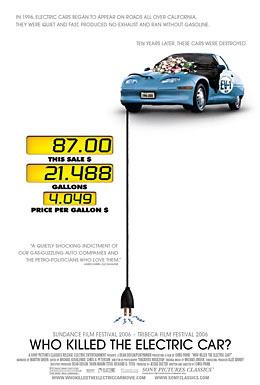 This is another decent documentary from 2006. Going into it, I was expecting a less publicized, but equally powerful Inconvenient Truth. With these expectations, I was disappointed, but I in the end, I feel that it held its own fairly well. Without trying to have political bias, I can imagine certain powers that prevented this movie from having a wider release. Despite the fact that some areas of the movie seemed a little glib and contrived, I still recommend it.
This is another decent documentary from 2006. Going into it, I was expecting a less publicized, but equally powerful Inconvenient Truth. With these expectations, I was disappointed, but I in the end, I feel that it held its own fairly well. Without trying to have political bias, I can imagine certain powers that prevented this movie from having a wider release. Despite the fact that some areas of the movie seemed a little glib and contrived, I still recommend it.Who Killed the Electric Car? plays out almost like a crime scene investigation. It follows the rise, and eventual fall of the EV1- the first commercial electric car. Writer/Director Chris Paine investigates different suspects in the demise of the vehicle. General Motors (who manufactured it), consumers, the car itself, the California Air Resources Board, and others are all held up under the microscope. At the end, Paine actually points his finger at certain culprits placing responsibility on them, while exonerating others.
The movie is interesting, and has some very good points, but did not seem to be as powerful as I had expected. I was anticipating the same reaction as an Inconvenient Truth (After all, that was just a lecture- this was a full blown movie). Who Killed the Electric Car? just didn't hold as much weight to it. I can't exactly place my finger on why not. Martin Sheen provided a very good, yet sparse narration, owners and designers alike weighed in passionately, and it stressed the possibilities that could come with using electric cars. Perhaps it lost a little clout when it started relying on celebrity testimonies from Mel Gibson, Phyllis Diller, Tom Hanks, and others. I think their presence was there to show how difficult it had been to acquire these cars, and how high the demand really was- but they just don't seem to hold as powerful sway in a documentary setting.
The most passionate interviewee was Chelsea Sexton, the person in charge of marketing the EV1 in California. She had done everything in her power to create a demand (which there was), and convince GM of this demand (which they ignored). When GM decided to recall all the cars they had leased, she personally visited the owners. This led to the one genuinely powerful scene in the movie where several of the owners followed the cars to the junk yard, where they scrapped these perfectly good machines.
The movie featured a lengthy section on Hydrogen Power, citing it as a detriment to the electric car, and a detriment to the environment. Paine says that in theory, it's a good idea, but the electric powered cars are already viable, and will be much more effective, and much cheaper than hydrogen power. I found it interesting that he would tackle a competing environmental solution, which I liked. I thought it took some courage to attack a popular issue that may not sit well with the target audience. This truly is a documentary, and not just an opinion piece.
As is apparent with the title, the electric car lost. The movie ends on an optimistic note, however, with many of those interviewed talking about how excited they are about the future. The rise of the hybrids, and alternative bio-fuels have created a sense of hope among the environmentalists. The movie is largely depressing- highlighting the struggles of a vehicle and those who defended it, and how they were doomed from the beginning (The title alone tells you this much). It ends on an upswing, however, giving a hopeful, yet cautionary view of the future. The movie gets its point across very effectively, but relies a bit too much on celebrity testimony (and an absurd memorial service- don't ask). It's not the best documentary, but it does what a documentary should.
3.5/5
No comments:
Post a Comment